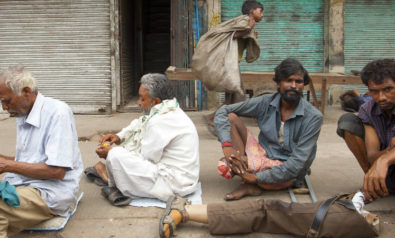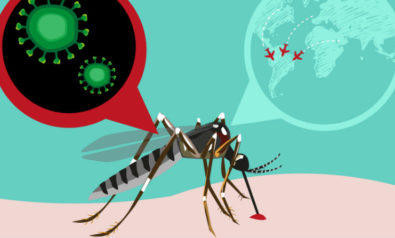The migrant crisis will impede our ability to deliver Sustainable Development Goals for 2030.
Post-2015, officials of the United Nations (UN) and other stakeholders started to think carefully about what development meant in this new era. Breaking down perceptions beyond extreme poverty or maternal health is still crucially important, but as a global development community, we acknowledged that development is achieved by thinking big. Peace, governance and reducing inequality, for instance, all affect levels of poverty, so it is important to work toward these goals.
[add-subscribe-form]
Migration is not excluded within this. It is recognized as both an important contributor to development and also a hindrance, if non-regular migrants are not adequately empowered. What was not banked on was the new wave of migration that is currently being experienced—the “crisis” within a sizeable bloc of the developed Western world.
An Unforeseen Problem
The waves of migrants fleeing war zones in search of new areas where they can attain basic needs like good health care and wellbeing rise as the number and activity of conflicts goes up year upon year.
The total number of those displaced by conflict and persecution in 2014 was 60 million, up by 8.3 million from the previous year. With conflicts raging in the Central African Republic, Iraq, South Sudan, Syria, Ukraine and Yemen, this has severely affected the influx toward the beginning of the decade and has forced thinking around an unforeseen problem.
Those assessing progress on goals such as health may have started feeling smug as they programmatically attach indicators within neat borders in order to methodically measure impacts and targets. However, this new and faster movement of people has added a dynamic that complicates this exercise.
Thousands, perhaps millions will be set in limbo as they reside within camps, wanted by no one, aided by charitable organizations that are facing resource and funding shortages, struggling to serve basic needs and faced with threatening endemics.
One criticism of the UN Millennium Development Goals (MDG) was the lack of equality in outcomes—that improvements were not felt by populations as a whole, but rather interventions aimed at specific diseases or sub-populations such as pregnant women.
This time, we are perhaps at risk of missing out a sub-population. Even if more investment was seen in a country’s health systems, how would this benefit the nation’s displaced populations sitting on an island off Greece or at the edge of France in Calais?
Migrants are particularly vulnerable as they have less access to health and social services, but face greater risks due to exploitation and abominable living conditions.
The state-challenged person’s struggle does not end at the camp. Even within urban settings, refugees living among local communities cannot always access the same services as others. This sometimes results in the informal provision of services or those who are left completely vulnerable and ultimately fall through the cracks.
A Full Definition of Health
There is also a need to include mental health within definitions of health, and it is now encompassed within the new Sustainable Development Goals (SDG), which have sought to build on the MDGs post-2015 to reflect more accurate indicators of development. Target 3.4 of the SDGs states: “By 2030, reduce by one-third premature mortality from noncommunicable diseases through prevention and treatment and promote mental health and well-being.”
Fundamentally, this aspect of health care compulsively remains unevaluated despite its dire need among refugee communities in particular. Amid the struggle to prioritize the basic fight for survival, experts have often commented on the effect of forced migration on the human psyche and the added toll felt by the migration process. This makes it difficult for an individual to heal when the requisite psycho-social support is not afforded to him or her.
There is also the dark figure of health statistics that we never find out about as the risks associated with human smuggling and trafficking pose more hazards than before. The World Health Organization (WHO), in a report on health in 2015, states that there had been over 2,700 migrant deaths recorded in early 2015, mostly in the Mediterranean.
Migrants are particularly vulnerable as they have less access to health and social services, but face greater risks due to exploitation and abominable living conditions.
Solutions
The UN believes it takes into account humanitarian crises and forced displacement of people in the 2030 goals and through the empowerment of vulnerable groups such as refugees and internally displaced persons.
Goal 10 aims to reduce inequality within and among countries. Specifically relevant is target 10.7 of the SDGs: “Facilitate orderly, safe, regular and responsible migration and mobility of people, including through the implementation of planned and well-managed migration policies.”
The indicators on this will be telling, as there are essentially two issues affecting successful achievement of the goals, the measurement of this target and avoiding omission of data, and political will to accept the reality of growing forced migration.
Firstly, to whom does the onus of collecting data fall: camp personnel or states that are hosting refugees both officially and unofficially?
Understanding how this data is affected by migration could perhaps be achieved by disaggregating data further. Data disaggregation is already encouraged by gender, age and rural/urban divide, so perhaps an added category relating to migration should be included.
Funding is a huge issue affecting those having to deliver health care to forced migrants. In light of extrapolating numbers, pressure is increasing on humanitarian aid responders. Perhaps an added dynamic to the targets under Goal 3 should relate to how much is put into emergency and humanitarian health care as well as camp-based settings.
When it comes to having migration-friendly policies, the International Organization of Migration (IOM), along with the Economist Intelligence Unit, is working on a new index to measure this metric, called the Migration Governance Index (MDI). The aim of this index is to measure the degree to which “national policies facilitate and promote responsible, safe and regular migration of people.” In addition, the IOM is designing an “inclusive SDG measurement system for migration data that ensures that “no-one is left behind.”
The Bigger Picture
How these initiatives play out will be seen in time. However, despite measurement efforts, the bottom line is that we need to humanize the current migration crisis so that those affected by conflict stop suffering infringements to basic rights such as good health (a fundamental human right as well as an SDG), and that the buck stops with governments and their willingness to instill fair and open policies to help realize these rights.
The current numbers, if they falter by 2030, could make all this an academic exercise. By record, however, we are not on track for any settling of dust. Conflict and violence are becoming more brutal, and our appetite for intervention is increasing, along with defense spending. All this creates a nice neat circle that brings us back to receiving more and more displaced persons in emergency situations.
The views expressed in this article are the author’s own and do not necessarily reflect Fair Observer’s editorial policy.
Photo Credit: Istvan Csak / Nicolas Economou / Shutterstock.com
 We bring you perspectives from around the world. Help us to inform and educate. Your donation is tax-deductible. Join over 400 people to become a donor or you could choose to be a sponsor.
We bring you perspectives from around the world. Help us to inform and educate. Your donation is tax-deductible. Join over 400 people to become a donor or you could choose to be a sponsor.
Support Fair Observer
We rely on your support for our independence, diversity and quality.
For more than 10 years, Fair Observer has been free, fair and independent. No billionaire owns us, no advertisers control us. We are a reader-supported nonprofit. Unlike many other publications, we keep our content free for readers regardless of where they live or whether they can afford to pay. We have no paywalls and no ads.
In the post-truth era of fake news, echo chambers and filter bubbles, we publish a plurality of perspectives from around the world. Anyone can publish with us, but everyone goes through a rigorous editorial process. So, you get fact-checked, well-reasoned content instead of noise.
We publish 2,500+ voices from 90+ countries. We also conduct education and training programs
on subjects ranging from digital media and journalism to writing and critical thinking. This
doesn’t come cheap. Servers, editors, trainers and web developers cost
money.
Please consider supporting us on a regular basis as a recurring donor or a
sustaining member.
Will you support FO’s journalism?
We rely on your support for our independence, diversity and quality.



















